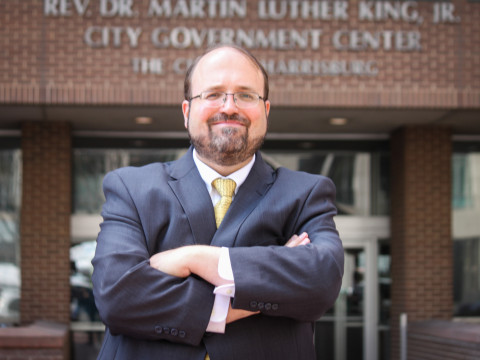Connecting state and local government leaders
“I would certainly hope to believe that this is the moment that the city has stabilized and begun to rebuild itself,” Mayor Eric Papenfuse says in an interview.
HARRISBURG, Pa. — Sometime in August, the City Council in Pennsylvania’s capital city is expected to decide whether to borrow roughly $3 million to help cover the cost of replacing about 6,000 existing streetlights with more energy-efficient LED fixtures.
If approved, the lighting upgrade would be a milestone of sorts for this cash-strapped city of approximately 50,000 residents. According to Mayor Eric Papenfuse, it would mark the first time the city government has borrowed a sizeable amount of money since emerging from a years-long financial emergency.
Around $360 million of debt connected to a troubled trash-to-energy incinerator located at the city’s southern end was a central factor in the crisis. The bleak fiscal situation drove the City Council to try to file for bankruptcy and eventually landed Harrisburg in “receivership” with a state appointee overseeing the city’s finances from late 2011 until March 2014.

Noting that the LED streetlight upgrades would be spread across neighborhoods in all parts of the city and would save money by reducing electricity costs, Papenfuse said in an interview: “It’s really a good project.”
“Had a hard time finding financing,” he added, “but did eventually get a local bank to come forward and do it.”
The possible streetlight purchase is just one example of how Papenfuse is looking to take small steps to improve infrastructure and services in Harrisburg, while also keeping a tight budget balanced and operating within the confines of a court-approved financial recovery plan.
Some of the city’s infrastructure is suffering from severe decay, illustrated dramatically in recent years when leaky underground pipes caused sinkholes, which damaged homes and undermined streets.
“I would certainly hope to believe that this is the moment that the city has stabilized and begun to rebuild itself,” Papenfuse said.
The mayor sat down with Route Fifty last Thursday at the Midtown Scholar Bookstore, an independent shop that he’s owned for over a decade in a historic section of midtown Harrisburg.
On the Tuesday prior to the interview, a former Harrisburg mayor, Stephen R. Reed, was charged with 499 criminal counts that have ties to the city’s financial collapse. Among other things, Reed is accused of diverting bond funds borrowed by public entities, and using the money to pay for items he was interested in, including artifacts said to be for a "Wild West" museum that was never built.
Reed took office in 1982 and served as Harrisburg’s chief executive for 28 years, losing a 2009 Democratic primary bid to Linda Thompson.
“It really sort of corrects the record,” Papenfuse said of a grand jury report, which outlines the allegations against Reed.
While Papenfuse said there was promise of financial stability and growth during what he called “The Reed Years,” he believes “a lot of that was built on financing that was an illusion, that clearly didn’t work financially and really, at its core, was corrupt.”
Reed has said he will fight the charges.
Papenfuse, also a Democrat, unseated Thompson after her first term and took office in January 2014. He characterizes himself as a fiscal conservative and said that his time as a business owner helps inform his approach to the city’s finances.
Much of the mayor’s first year in office was about “proving that we could run city government in a responsible way.” That meant getting bills paid on time and balancing the budget.
“We actually had over $5 million of a fund balance by the end of the year,” Papenfuse noted.
Going forward, his aim is to develop a “stable financial foundation that really works.”
But challenges and tough decisions abound.
Parking revenue that was supposed to provide the city with a key source of funding under the terms of the recovery plan is falling far short of projections due to problems collecting and processing fines. It was slated to generate about $2.5 million for the city this year, but Papenfuse said the figure is looking like it will be closer to half that amount. Vacant buildings and tax-exempt property owned by the state government limit Harrisburg’s tax base. The city closed down a fire station last year to cut costs. And U.S. Census Bureau figures for 2009 to 2013 show 32 percent of Harrisburg residents live in poverty.
“The city is much, much smaller than it was. The police department is like half the size,” said Papenfuse. “We’d like to have additional capacity, but we can’t really afford it and that’s the only way to live within our means. So it really means changing expectations.”
Expectations, he said, among unionized city employees—some of whom have had to take on expanded work responsibilities—and among the public about “what it is the city can and can’t do.”
“We’re paying very high trash rates, we’re paying very high parking rates, we’re paying very high earned income tax,” Papenfuse explained. “We’re maxed, the residents of Harrisburg can’t afford to pay anymore. So our revenues are as high as they can be.”
“The only way we’re going to, in the long term, be able to increase services, or increase what we offer, is by growing the tax base first,” he added. “Until we bring in more people we’re sort of stuck.” As part of a push to broaden the number of people and businesses paying into the city’s coffers, Papenfuse has championed a set of tax breaks for improvements to residential properties and for commercial development, which won City Council approval in May.
The tax abatement package is still awaiting approval from Dauphin County and the Harrisburg School District before it can be enacted, according to a spokeswoman in the mayor’s office.
In the meantime, Papenfuse points to other signs of progress.
For the first time in seven years, two public swimming pools are open at the same time this summer. The city funneled grant dollars to the facilities in order to make repairs.
Papenfuse also highlighted that Harrisburg was able to save money last year by actually hiring more firefighters, which decreased fire department overtime by about $1 million.
Asked whether he felt that the city’s recovery plan, dubbed the “Harrisburg Strong Plan,” has set the city on the right track, Papenfuse said that he believed that overall it had. A major tenet of the plan was selling the incinerator, which the city did in late 2013, offloading the facility to the Lancaster County Solid Waste Management Authority.
“Ultimately, the recovery plan eliminated hundreds of millions of dollars worth of debt, sort of stabilized the city’s debt burden for the next 20-plus years at a certain percentage of revenue, and has now left us to govern ourselves responsibly,” the mayor said. “But our costs of government are increasing, and our expenditures are increasing, and our revenues need to grow.”
That said, he added: “Basically we’ve been given a fresh start.”
Bill Lucia is a Reporter for Government Executive’s Route Fifty.

NEXT STORY: With Puerto Rico on Fiscal Brink, Senators Introduce Chapter 9 Bill to ‘Avert Disaster’




